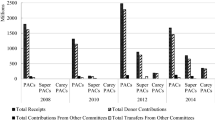Abstract
This paper investigates the effects of the sources ofcandidates' campaign funding on their electoral outcomes, withparticular emphasis on whether candidates who rely on a narrowbase of funding suffer adverse electoral consequences. Anextensive dataset consisting of over 650,000 contributions toHouse candidates in elections from 1980 to 1992 is used. Theresults reveal a negative relationship between theconcentration of contributions and voteshare for open seatcandidates and challengers. This finding appears to havesignificant implications for some of the empirical premisesunderlying the U.S. Supreme Court's landmark Buckley v.Valeo decision. At the very least, it represents an importantstylized fact about US elections that is robust over 1980–1992 period.
Similar content being viewed by others
References
Abramovitz, A.I. (1988). Explaining senate election outcomes. American Political Science Review 82: 385-403.
Austen-Smith, D. (1987). Interest groups, campaign contributions, and probabilistic voting. Public Choice 54: 123-139.
Austen-Smith, D. (1995). Campaign contributions and access. American Political Science Review 89: 566-581.
Depken, C.A., II (1998). The effects of campaign contribution sources on the congressional elections of 1996. Economics Letters 58: 211-215.
Dharmapala, D. (1999). Comparing tax expenditures and direct subsidies: The role of legislative committee structure. Journal of Public Economics 72: 421-454.
Erikson, R.S. and Palfrey, T.R. (1998). Campaign spending and incumbency: An alternative simultaneous equations approach. Journal of Politics 60: 355-373.
Gerber, A. (1998). Estimating the effect of campaign spending on senate election outcomes using instrumental variables. American Political Science Review 92: 401-411.
Green, D.P. and Krasno, J.S. (1988). Salvation for the spendthrift incumbent: Reestimating the effects of campaign spending in House elections. American Journal of Political Science 32: 884-907.
Grossman, G.M. and Helpman, E. (1996). Electoral competition and special interest politics. Review of Economic Studies 63: 265-286.
Hay, D.A. and Morris, D.J. (1979). Industrial economics: Theory and evidence. Oxford: Oxford University Press.
Jacobson, G.C. (1978). The effects of electoral campaign spending in congressional elections. American Political Science Review 72: 469-491.
Jacobson, G.C. (1990). The effects of campaign spending in House elections: New evidence for old arguments. American Journal of Political Science 34: 334-362.
Kroszner, R.S. and Stratmann, T. (1998). Interest group competition and the organization of congress: Theory and evidence from financial services' political action committees. American Economic Review 88: 1163-1187.
Lazear, E. and Rosen, S. (1981). Rank-order tournaments as optimum labor contracts. Journal of Political Economy 89: 841-864.
Levit, K.J. (1993). Campaign finance reform and the return of Buckley v. Valeo. Yale Law Journal 103: 469-503.
McKelvey, R.D. and Ordeshook, P.C. (1984). Rational expectations in elections: Some experimental results based on a multidimensional model. Public Choice 44: 61-102.
McKelvey, R.D. and Ordeshook, P.C. (1985). Elections with limited information: A fulfilled expectations model using contemporaneous poll and endorsement data as information sources. Journal of Economic Theory 36: 55-85.
Milyo, J. (1998). The electoral effects of campaign spending in house elections: A natural experiment approach. Paper presented at the 1998 Public Choice Society meetings in New Orleans, LA.
Moore, W.K. (1980). The case of an independent political action committee. In M.J. Malbin (Ed.), Parties, interest groups, and campaign finance laws, 56-67. Washington D.C.: American Enterprise Institute.
Palda, F. (1994). How much is your vote worth? San Francisco: Institute for Contemporary Studies Press.
Palda, F. (1997). Are campaign contributions a form of speech? The case of the 1990 congressional elections. Paper presented at the 1997 European Public Choice Society Meetings in Prague.
Palda, F. and Palda, K.S. (1998). The impact of campaign expenditures on political competition in the French legislative elections of 1993. Public Choice 94: 157-174.
Smith, B.A. (1997). Money talks: Speech, corruption, equality, and campaign finance. Georgetown Law Journal 86: 45-99.
Sunstein, C.R. (1994). Political equality and unintended consequences. Columbia Law Review 94: 1390-1414.
Tullock, G. (1980). Efficient rent-seeking. In J.M. Buchanan, J.M. Tollison and G. Tullock (Eds.), Toward a theory of the rent-seeking society, 97-112. College Station, TX: Texas A&M Press.
Weingast, B.R. and Marshall, W.J. (1988). The industrial organization of congress. Journal of Political Economy 96: 132-163.
Wittman, D.A. (1989). Why democracies produce efficient results. Journal of Political Economy 97: 1395-1424.
Author information
Authors and Affiliations
Rights and permissions
About this article
Cite this article
Dharmapala, D., Palda, F. Are Campaign Contributions a Form of Speech? Evidence from Recent US House Elections. Public Choice 112, 81–114 (2002). https://doi.org/10.1023/A:1015671608957
Issue Date:
DOI: https://doi.org/10.1023/A:1015671608957




